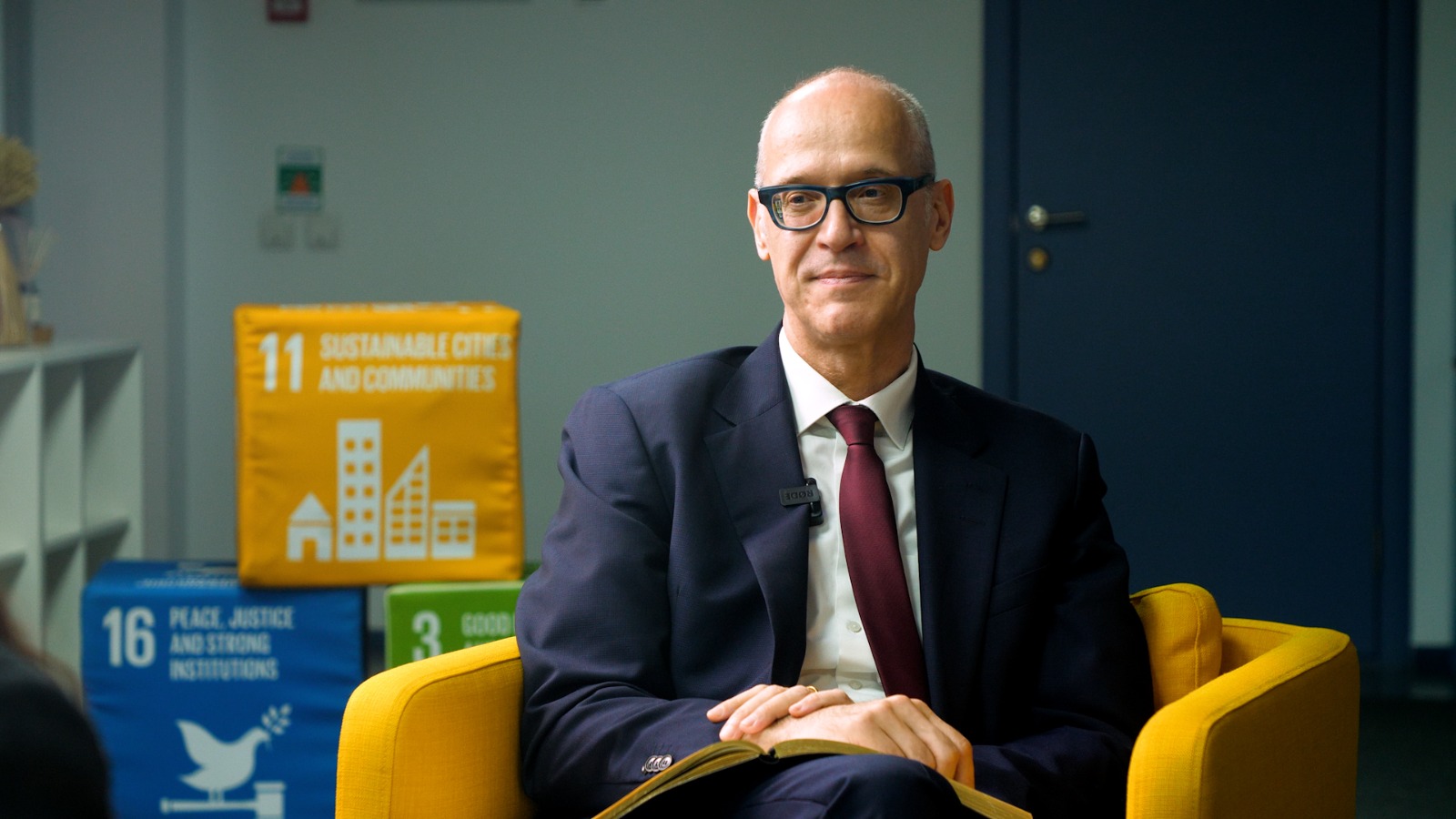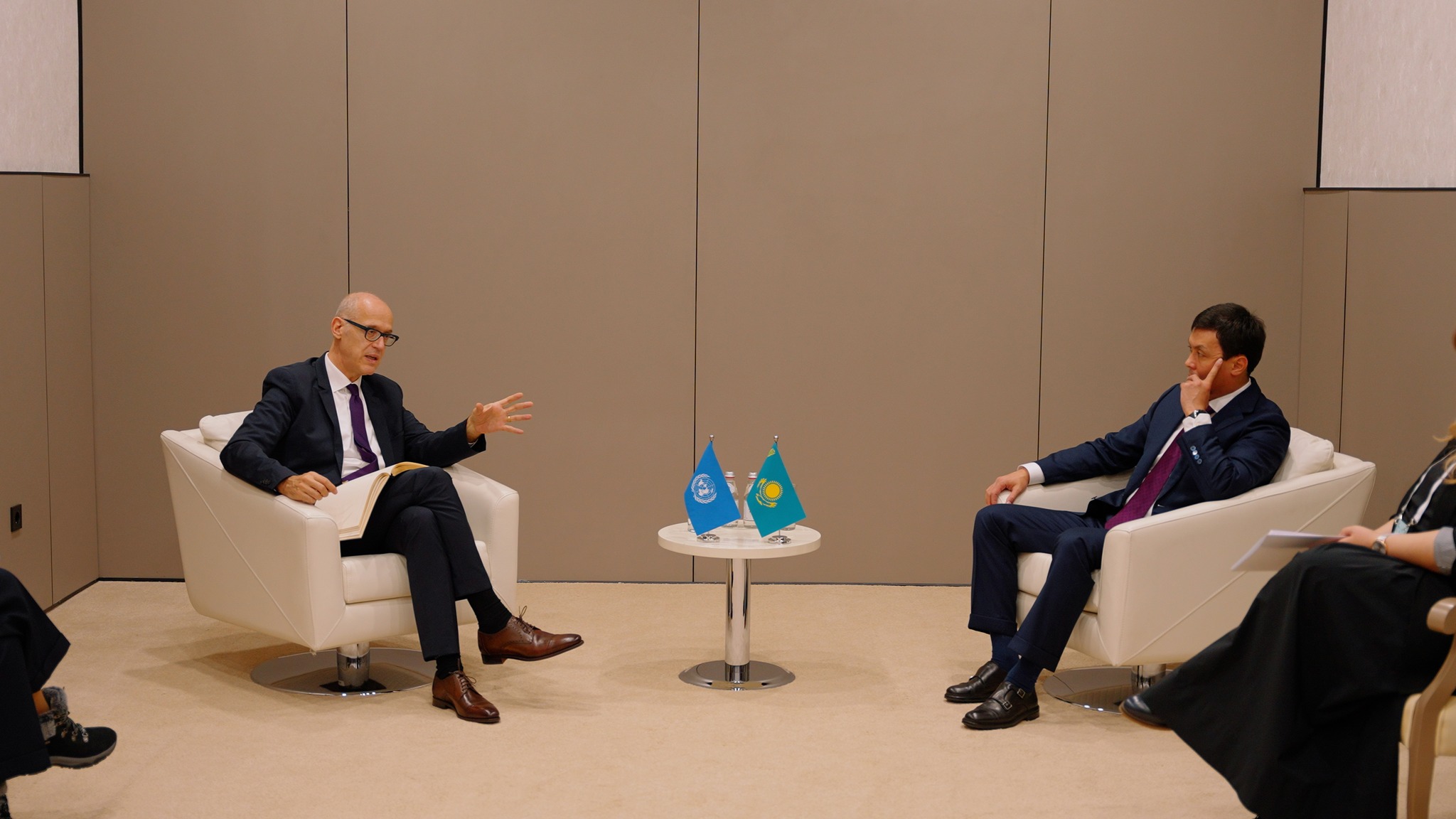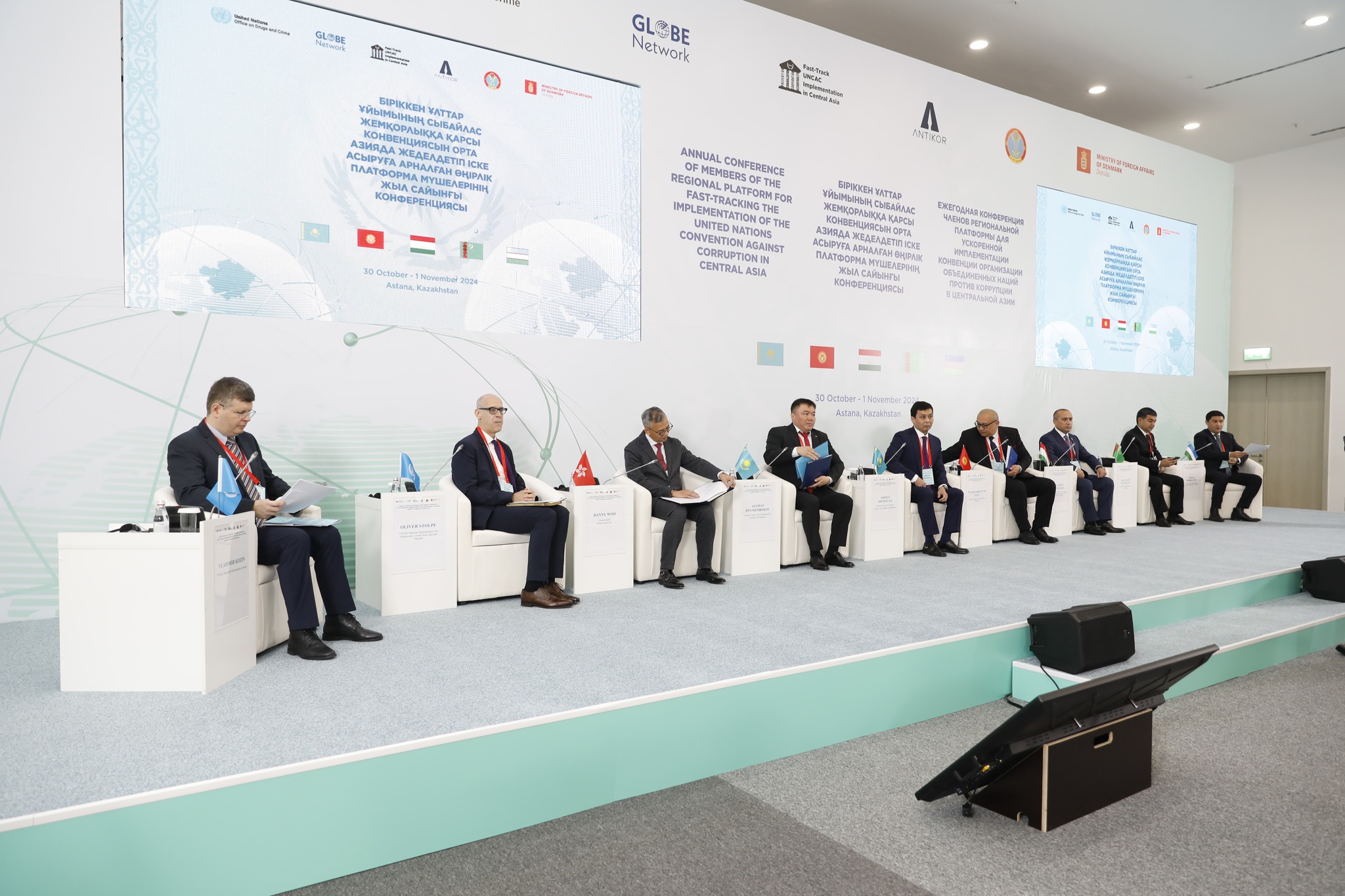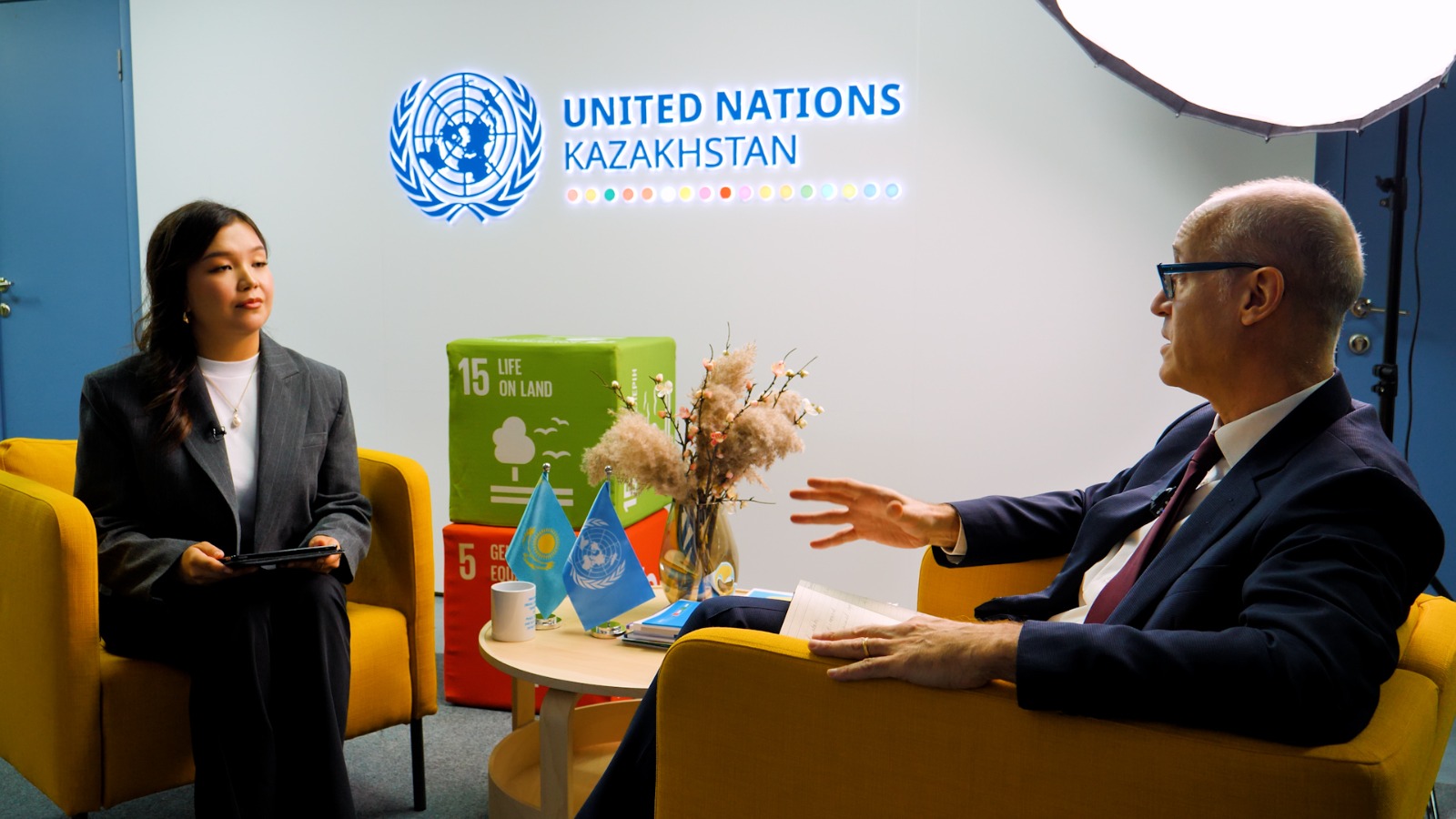ASTANA – Oliver Stolpe, regional representative of the United Nations Office on Drugs and Crime (UNODC) for Afghanistan, Central Asia, Iran, and Pakistan, highlighted Kazakhstan’s efforts to recover assets illicitly transferred abroad in a recent interview with The Astana Times.

Oliver Stolpe wrapped up his visit to Astana on Oct. 31. The visit featured discussions with Kazakh government officials to enhance collaboration between UNODC and Kazakhstan. Photo credit: The Astana Times
Stolpe wrapped up his visit to Astana on Oct. 31 with discussions with the Kazakh government officials to enhance collaboration with Kazakhstan. During the visit, he met with Kazakhstan’s First Deputy Foreign Minister Akan Rakhmetullin, Vice Minister of Culture and Information Yevgeniy Kochetov, and Kairat Kambarov, head of the Committee on Youth and Family Affairs.
He also participated in the Annual Conference of Members of the Central Asian Platform for Fast Tracking the Implementation of the UN Convention against Corruption. On the sidelines of the three-day event, Stolpe met with Askhat Zhumagali, head of Kazakhstan’s Anti-Corruption Agency, and Kairat Dzhumagulov, deputy chairman of the State Revenues Committee.

Oliver Stolpe and Askhat Zhumagali. Photo credit: UNODC Central Asia
Asset recovery efforts
In recent years, Kazakhstan has intensified its efforts to recover assets illicitly transferred abroad, implementing comprehensive legal reforms and fostering international collaborations.
In July 2023, President Kassym-Jomart Tokayev signed the law on the return of illegally acquired assets to the state. This legislation targets individuals who have held or currently hold public positions, including those in state legal entities, the quasi-public sector, and their affiliates.
The Asset Recovery Committee was formed within the Prosecutor General’s Office to oversee these initiatives. This committee is responsible for coordinating efforts to identify, freeze, and repatriate assets obtained through illicit means. Later, a separate Returned Asset Management Company was created to manage, ensure safety, and sell the returned assets.
“It is a very good step. It comes against a historical context where Kazakhstan has already been engaged in the recovery, return, management and disposal of recovered assets for a while and quite successfully. There is a body of knowledge to build on, and establishing this committee is exactly the right next step to institutionalize that experience,” said Stolpe.
The UN official emphasized that Kazakhstan’s next steps should focus on assessing its domestic capacity, specifically examining whether the country has the necessary legal tools, operational capabilities, and skilled personnel to handle asset recovery effectively.

Astana hosted the Annual Conference of Members of the Central Asian Platform for Fast Tracking the Implementation of the UN Convention against Corruption. Photo credit: UNODC in Central Asia
“Because asset recovery is not a single agency task. It brings together financial intelligence, prosecutors, and investigators. Also, the private sector can play an important role, and we need to bring them together to establish some form of domestic coordination,” he said, adding that the committee can fulfill that goal.
Regarding the returned asset management company, Stolpe said he is “very curious about that experience.” “That sounds to me very innovative. I would like to study that a little bit deeper because the transparent and accountable management and the disposal of recovered assets is the next big challenge,” he added.
As of July, the Anti-Corruption Service reported the return of approximately 1.07 trillion tenge (around $2.2 billion) over the past two and half years, with plans to direct these funds toward socio-economic projects.
Public trust and accountability
Stolpe also acknowledged that public trust in asset recovery efforts is fragile, as citizens often fear that recovered funds might once again fall into the wrong hands.
“That is a concern that we need to take very seriously and I am very glad to see how seriously Kazakhstan is taking it. Our job will now be to accompany the work of the asset recovery committee and to give them the necessary skill sets to work on the legislation, but then also start connecting them to the existing international networks – judicial and law enforcement – that give them opportunities to engage in case consultations with their international partners for more asset recovery in the future,” he explained.
Stolpe suggested that local public accountability committees could be a powerful tool for transparency, especially in cases involving large-scale asset recovery and the reinvestment of recovered funds. He emphasized that rather than providing only general updates, authorities should engage directly with the communities where projects funded by recovered assets are being implemented.

Assel Satubaldina and Oliver Stolpe during the interview. Photo credit: The Astana Times
When citizens are informed about the specific details of each project, they can hold the government accountable if projects are not delivered as promised. This approach, he noted, strengthens public trust and ensures that the benefits of recovered assets truly reach those they are intended to help.
Fighting corruption is a universal struggle
Stolpe emphasized that no country is immune to challenges faced in the fight against corruption. Kazakhstan is no exception.
“The first thing that needs to happen in any country that wants to get serious about addressing that specific corruption challenge is to actually properly understand where exactly it is happening, which type of public officials are affected, and where are the geographic hot spots of corruption,” he said.
He suggested that a national corruption survey could be a helpful tool to allocate resources effectively rather than focusing on issues that may be less critical in the eyes of the public.
Stolpe further highlighted the importance of empowering citizens to participate in anti-corruption efforts.
“I don’t mean that in a theoretical way, but very concretely speaking. You need to provide them with complaint mechanisms that are easy to access and, in the ideal case, anonymously. Social media can be a very powerful tool for reporting incidents of corruption instantly, including through providing video or audio recordings, photos, and short reports from citizens. Once you have that, you need a robust and swift disciplinary process which reassures citizens that complaints are being taken seriously” he said.
While criminal justice plays a role, he suggested that a swift disciplinary response is often more effective in cases of minor, low-level corruption. Such a system can help remove individuals from public institutions if they fail to meet the integrity standards expected of them.
Youth need to be empowered to stand against crime
Youth empowerment is an important priority for the UNODC and the UN in general. The organization believes youth can be agents of change. UN survey shows that 67% of people believe in a better future, with 15 to 17-year-olds being the most optimistic about this.
Stolpe highlighted a key initiative, the Global Resource for Anti-Corruption Education (GRACE), which offers a comprehensive toolkit to foster integrity and build a culture of shunning all forms of corruption among young people. This initiative includes games, videos, interactive apps, and resources for teachers designed to engage youth in discussions about integrity.
“The word ‘corruption’ may not even arise in the conversation to reinforce positive values and sensitize young people about what is right and wrong. We have gone quite far. Several countries in the region have already committed to integrating this program into their educational systems. Of course, political decisions in these cases are relatively easy and quick to do. The bigger challenge is how to roll it out to tens of thousands of public schools, and that is exactly what we want to support the Government in achieving as a next step,” said Stolpe.
Watch the full interview with Oliver Stolpe on The Astana Times YouTube channel.
